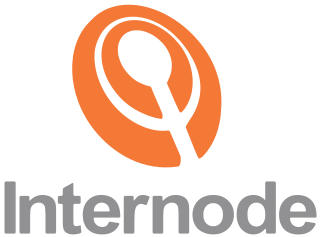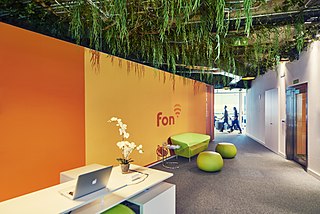 | |
| Founded | 2002 |
|---|---|
| Products | Municipal wireless network |
MetroFi was a provider of municipal wireless network service in several cities in the western United States.
 | |
| Founded | 2002 |
|---|---|
| Products | Municipal wireless network |
MetroFi was a provider of municipal wireless network service in several cities in the western United States.
MetroFi was founded in 2002 by Chuck Haas, who helped start Covad, and Pankaj Shah, in Mountain View, California. [1] Investors included Sevin Rosen Funds, August Capital, and Western Technology Investments. Funding of $9 million was announced in April 2004, as well as an "Investors' Choice" award at the Dow Jones Wireless Ventures private equity conference. [2]
MetroFi announced conventional Wi-Fi wireless Internet access to municipalities in September 2005 at the MuniWireless show in San Francisco. [3] [4] It began offering free, advertising-supported, unencrypted, low-bandwidth wireless Internet access in December 2005 in parts of its local Silicon Valley area. [5] In most of its service areas it provided an unencrypted, advertising-supported "free" service as well as an encrypted (using Wi-Fi Protected Access), ad-free "premium" service for approximately $20 per month. During 2006, its data rate was restricted to 1 Mbit/s downstream and 256 kbit/s upstream. Coverage and performance of the premium and free service was otherwise identical. MetroFi also provided fixed-wireless service.
The company planned to use wireless mesh network technology from SkyPilot, [6] and the Webwise targeted advertising service from Phorm. [7]
Cities covered, according to the MetroFi Web site, included: [4]
The Riverside announcement included a partnership with AT&T announced in July 2006. [8]
A test of the ability to get a connection in outdoor areas within 500 feet of an access point in the Portland proof-of-concept network in the early spring of 2007 showed about a 58% probability using a standard 30 mW, low-gain client device. The report concluded that the probability the network was providing a connection to those devices in 90% of outdoor areas, as called for, was two in a billion. [9] The Portland network was less than 30% complete, and as of October 2007 further deployment halted. The contract with Portland required MetroFi to complete the network by August 2009. [10] A group monitoring the Portland network estimated that the network provided a 90% probability of getting a connection outdoors in about 4% of the city in late 2007. [11] [12]
On May 15, 2008 MetroFi announced that it was seeking buyers for its networks. [13] Having failed to find a buyer, it scheduled and performed a shutdown of its network on June 20, 2008. [14] MetroFi offered to sell its Portland network to the city. [15] However, in October 2008, assets of the Portland network were seized by the city as abandoned. [16] Santa Clara acquired the MetroFi network in that city to support its Silicon Valley Power utility. [17] It redesigned and expanded service in 2012. [18] [19]
Telecommunications in the Dominican Republic include radio, television, fixed and mobile telephones, and the Internet.

Wi-Fi is a family of wireless network protocols based on the IEEE 802.11 family of standards, which are commonly used for local area networking of devices and Internet access, allowing nearby digital devices to exchange data by radio waves. These are the most widely used computer networks, used globally in home and small office networks to link devices and to provide Internet access with wireless routers and wireless access points in public places such as coffee shops, hotels, libraries, and airports to provide visitors.

Wireless communication is the transfer of information (telecommunication) between two or more points without the use of an electrical conductor, optical fiber or other continuous guided medium for the transfer. The most common wireless technologies use radio waves. With radio waves, intended distances can be short, such as a few meters for Bluetooth or as far as millions of kilometers for deep-space radio communications. It encompasses various types of fixed, mobile, and portable applications, including two-way radios, cellular telephones, personal digital assistants (PDAs), and wireless networking. Other examples of applications of radio wireless technology include GPS units, garage door openers, wireless computer mouse, keyboards and headsets, headphones, radio receivers, satellite television, broadcast television and cordless telephones. Somewhat less common methods of achieving wireless communications involve other electromagnetic phenomena, such as light and magnetic or electric fields, or the use of sound.

A wireless Internet service provider (WISP) is an Internet service provider with a network based on wireless networking. Technology may include commonplace Wi-Fi wireless mesh networking, or proprietary equipment designed to operate over open 900 MHz, 2.4 GHz, 4.9, 5, 24, and 60 GHz bands or licensed frequencies in the UHF band, LMDS, and other bands from 6 GHz to 80 GHz.

Internode Pty Ltd is an Australian Internet service provider (ISP) that provides NBN broadband services, business-class broadband access, web hosting, co-location, Voice over IP, and a variety of related services. Internode became part of TPG Telecom in July 2020.

A hotspot is a physical location where people can obtain Internet access, typically using Wi-Fi technology, via a wireless local-area network (WLAN) using a router connected to an Internet service provider.
Metro is a free weekly newspaper published by the San Jose, California, based Metro Newspapers. Also known as Metro Silicon Valley, as well as Metroactive online, the paper serves the greater Silicon Valley area. In addition to print form, Metro can be downloaded in PDF format for free from the publisher's website. Metro also keeps tabs on local politics and the "chattering" class of San Jose through its weekly column, The Fly.

Fon Wireless Ltd. is a for-profit company incorporated and registered in the United Kingdom that provides wireless services. Fon was founded in Madrid, Spain, in 2006, by Martín Varsavsky where it headquarters most of its operations.

Google WiFi is a municipal wireless network deployed in Mountain View, California. It is entirely funded by Google and installed primarily on Mountain View lightposts. Google had committed to keeping the service free until 2010. The initial service was shut down by Google on May 3, 2014 at their Mountain View base, and provided a new public outdoor WiFi.

A municipal wireless network is a citywide wireless network. This usually works by providing municipal broadband via Wi-Fi to large parts or all of a municipal area by deploying a wireless mesh network. The typical deployment design uses hundreds of wireless access points deployed outdoors, often on poles. The operator of the network acts as a wireless internet service provider.
Municipal broadband, sometimes referred to as a "Government-owned Network" or GON, is broadband Internet access offered by public entities. Services are often provided either fully or partially by local governments to residents within certain areas or jurisdictions. Common connection technologies include unlicensed wireless, licensed wireless, and fiber-optic cable. Many cities that previously deployed Wi-Fi based solutions, like Comcast and Charter Spectrum, are switching to municipal broadband. Municipal fiber-to-the-home networks are becoming more prominent because of increased demand for modern audio and video applications, which are increasing bandwidth requirements by 40% per year. The purpose of municipal broadband is to provide internet access to those who cannot afford internet from internet service providers and local governments are increasingly investing in said services for their communities.

Ricochet was one of the first wireless Internet access services in the United States, before Wi-Fi, 3G, and other technologies were available to the general public. It was developed and first offered by Metricom Incorporated, which shut down in 2001. The service was originally known as the Micro Cellular Data Network, or MCDN, gaining the Ricochet name when the service was launched to the public.

Alvarion Technologies is a global provider of autonomous Wi-Fi networks designed with self-organizing capabilities for carrier-grade Wi-Fi, enterprise connectivity, smart city planning, smart hospitality, connected campuses, and connected events.

Boingo Wireless is an American company that designs, builds and manages wireless networks. Its public and private networks include distributed antenna systems (DAS), small cells, macro towers and more than one million Wi-Fi hotspots around the world. The company operates networks for airports, transit stations, stadiums, military bases, hospitals and commercial properties. In December 2022, the company announced it was moving its headquarters to Frisco, Texas, and would maintain regional offices in Los Angeles, New York, Chicago and Las Vegas. The company was listed on the Nasdaq until it was acquired by investment firm Digital Colony Management LLC in 2021.
San Francisco Municipal Wireless was a canceled municipal wireless network that would have provided internet access to the city of San Francisco, California.
TalkTalk Telecom Group plc is a company that provides pay television and Internet access services to businesses and consumers in the United Kingdom. It was founded in 2003 as a subsidiary of Carphone Warehouse and was demerged as a standalone company in March 2010. Its headquarters are in Salford.
Radwin is a wireless communications manufacturing company that produces wireless communications systems used by telecoms carriers, city and town councils, remote communities, ISPs, WISPs, and private networks. It also creates hardware for transportation applications such as metro systems, bus networks, ferries, airports, and vehicles such as patrol vehicles, manned and unmanned heavy machinery used in mines and ports. The hardware is used for applications, including mobile and IP backhaul, home and enterprise wireless broadband access, private network connectivity, and video surveillance transmission. As part of the Smart City initiative in India by Prime Minister Narendra Modi, Radwin entered a partnership with Avaya in 2016.
Towerstream Corporation is a Fixed Wireless Fiber Alternative company delivering high-speed Internet access to businesses. The company offers broadband services in 12 urban markets including New York City, Boston, Los Angeles, Chicago, Philadelphia, the San Francisco Bay area, Miami, Seattle, Dallas-Fort Worth, Houston, Las Vegas-Reno, and the greater Providence area, where the company is headquartered. In 2014, Towerstream launched its On-Net fixed-wireless service offering On-Net building tenants access to dedicated, symmetrical high-speed Internet connectivity, with a premier SLA, at market-setting prices. Founded in 1999 by Philip Urso and Jeffrey Thompson (eFortress), Towerstream held its first public offering in January 2007 and traded on the NASDAQ Capital Markets under symbol TWER. In November 2016 the stock had declined in price, was delisted from NASDAQ, and moved to the over-the-counter market.
EarthLink is an American Internet service provider.

The city of Minneapolis, Minnesota, is covered by a citywide broadband wireless internet network, sometimes called Wireless Minneapolis. The network was first proposed in 2003, at which point only a few other cities nationwide had such systems in place. Local firm US Internet beat out EarthLink to build and operate the network, with a guaranteed ten-year, multimillion-dollar contract from the city itself as the network's anchor tenant. Construction began on the project in 2006, but encountered several delays. Most of the city was covered by the network by 2010, and USI Wireless, the subsidiary of US Internet responsible for the system, set up numerous free internet access points at public locations around Minneapolis.